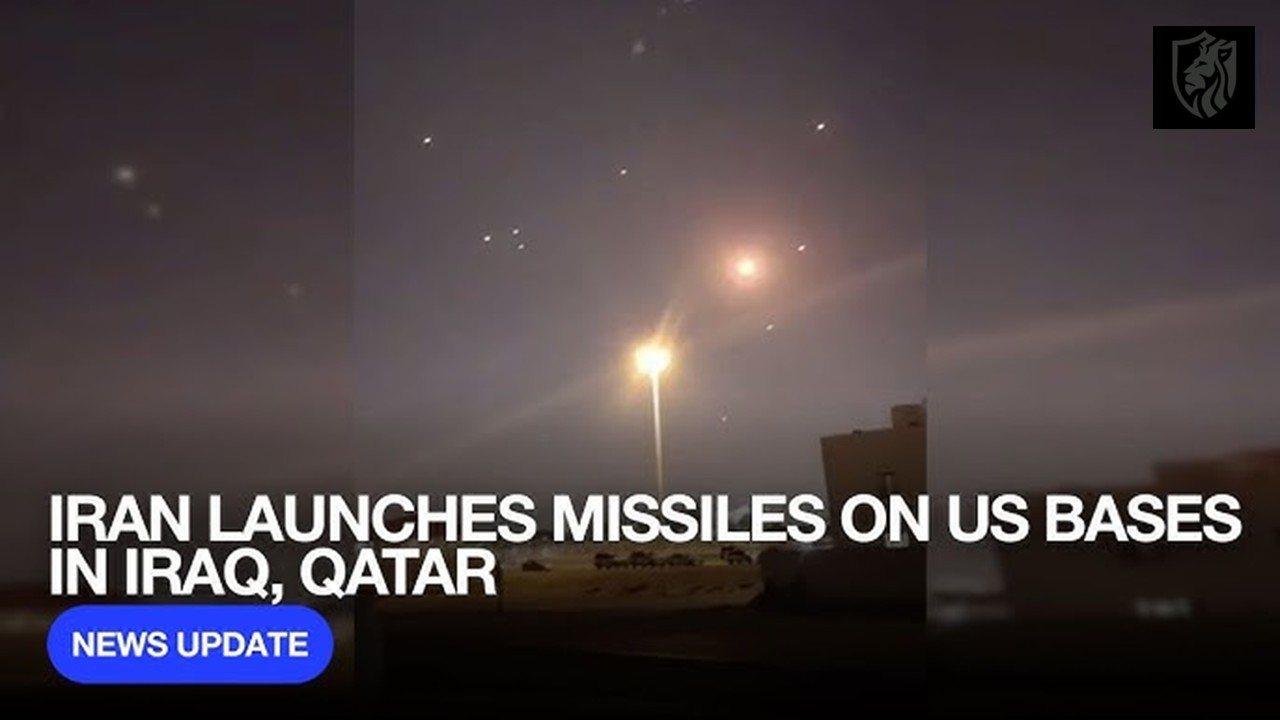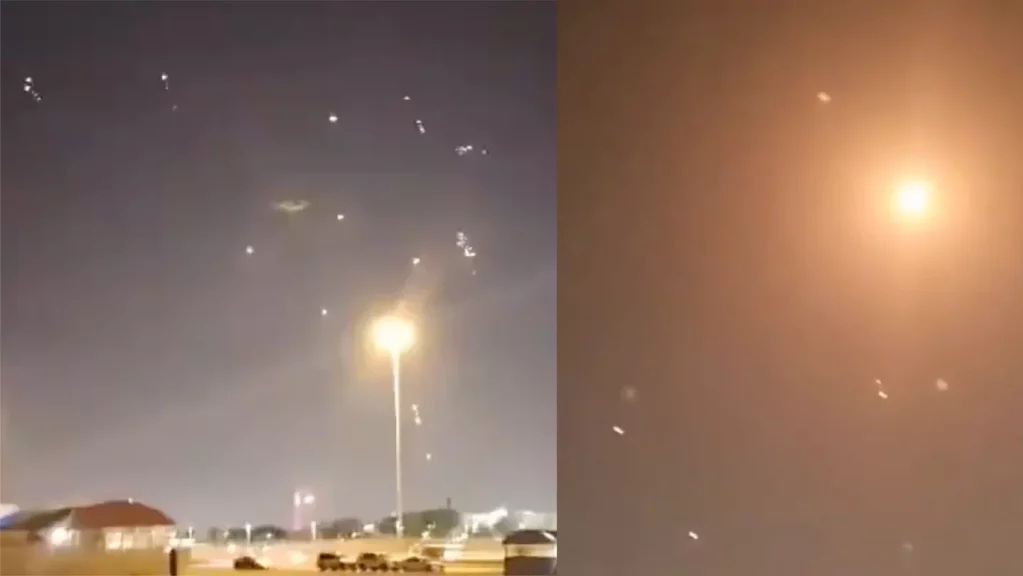
Iran Attack on Qatar and Iraq
Iran launched missile attacks on US military bases in Qatar and Iraq on Monday, retaliating for the American bombing of Iran’s nuclear sites and escalating tensions in the volatile region.
People in Doha, Qatar’s capital, paused and looked up as missiles flew and interceptors fired, striking at least one missile in the night sky.
Iran announced on state television that it had attacked American forces stationed at Qatar’s Al Udeid Airbase.
As martial music played, a caption on the screen read, “A mighty and successful response to America’s aggression.”
An Iraqi security official told The Associated Press that Iran also targeted the Ain al-Assad base in western Iraq, which houses US troops. The officials remained anonymous due to their lack of authority to make public statements.
The attacks came shortly after Qatar closed its airspace in response to rising threats from Iran. Just before the blasts, Iranian President Masoud Pezeshkian posted on X, defending Iran’s right to retaliate.
He stated, “We did not start this war, but we will answer any invasion of Iran.” Previously, Iran had threatened U.S. forces stationed at Al Udeid Air Base in Qatar. That base serves as the forward headquarters for U.S. Central Command in the region.
Despite tensions, Qatar maintains diplomatic ties with Iran and shares a massive offshore gas field with it. Earlier that day, Israel expanded its offensive, hitting symbols of Iran’s ruling regime. Israeli strikes targeted the gate of a notorious Tehran prison that holds political detainees.
They also hit the headquarters of the military force known for crushing recent domestic protests. Together, these events mark a sharp escalation in the ongoing conflict across the region.

Smoke rose over Tehran
Another barrage of Iranian missiles and drones hit Israel as plumes of thick smoke rose over Tehran. The ongoing fire has become a reality for civilians in both countries since Israel launched the war to target Tehran’s rapidly expanding nuclear program.
On the 11th day of the conflict, Israel claimed to have attacked “government targets and repression bodies in the heart of Tehran,” but Israeli officials denied seeking to overthrow Iran’s government, their archenemy since the country’s 1979 Islamic Revolution.
The Israeli military warned Iranians that it would continue to attack military sites near Tehran in the coming days, as its focus has shifted to symbolic targets as well.
The military issued the warning on the social media platform X, although Iranians are unable to communicate with the rest of the world due to an internet shutdown.
The latest strikes came just hours after President Donald Trump openly discussed the possibility, following America’s unprecedented stealth-bomber strike on three Iranian nuclear sites the day before.
“If the current Iranian regime is unable to MAKE IRAN GREAT AGAIN, why wouldn’t there be a regime change???” The official requested this on his Truth Social website.
Karoline Leavitt, the White House press secretary, later described Trump as “simply raising a question.” However, suggestions of overthrowing the Iranian government sparked new outrage in Tehran, which insists it will not negotiate at this time and has threatened to retaliate directly against American troops or interests in a Middle East already roiled by the ongoing Israel-Hamas conflict in the Gaza Strip.
Tehran initiates a new chapter of war.
During the Tehran strikes, Israel blew open a gate at Evin Prison. Iranian state television broadcast black-and-white surveillance footage of the strike at the facility known for housing dual nationals and Westerners, which Iran frequently uses as bargaining chips in negotiations with the West.
Evin also has special units for political prisoners, which are run by the Revolutionary Guard, a paramilitary organization that reports only to Supreme Leader Ayatollah Ali Khamenei. The facility has faced sanctions from both the United States and the European Union.
There were no immediate reports of casualties or significant damage in Iran, but the semiofficial news agency Tasnim reported a power outage outside Tehran following the Israeli strikes.
Iranian state television also aired footage purportedly shot inside Evin, showing prisoners under control. However, the Washington-based Abdorrahman Boroumand Center for Human Rights in Iran expressed concern about the conditions of the prisoners.
“Many families of current detainees have expressed deep concern about the safety and condition of their loved ones held inside the prison,” according to the report.
Iranian Gen. Abdolrahim Mousavi
Earlier Monday, Iranian Gen. Abdolrahim Mousavi, the chief of joint staff of the armed forces, warned Washington that its strikes had given Iranian forces a “free hand” to “act against U.S. interests and its army.”
The Middle East hosts tens of thousands of American troops, many of whom are vulnerable to Iranian short-range missiles.
The Israeli military also confirmed that it struck roads near Iran’s Fordo enrichment facility to prevent access to the site. The US targeted the underground site as part of its attack on three nuclear facilities on Sunday. The Israeli military did not elaborate.
Israel’s Defence Ministry declared, “We will punish the Iranian dictator with full force for attacking the Israeli home front.”
According to an Israeli official familiar with the government’s strategy, Israel is targeting these sites to put pressure on Iran’s administration without actively seeking to destabilize them. The official spoke on the condition of anonymity to discuss internal government decisions.
Nuclear fears rise following US strikes.
In Vienna, the UN nuclear chief warned of major damage at Fordo after Sunday’s U.S. bunker-buster airstrike. The United States joined Israel’s conflict by striking Iranian nuclear sites, sparking fears of a broader regional war. Iran declared that Washington’s firing of missiles and 30,000-pound bunker-buster bombs at three facilities was a violation of international law.

Several Iranian officials, including spokesman Behrouz Kamalvandi, claim Iran removes nuclear material from targeted sites in advance. IAEA chief Rafael Grossi told the agency’s board on Monday about a June 13 conversation with Foreign Minister Abbas Araghchi.
Araghchi said Iran would “adopt special measures to protect nuclear equipment and materials.” In response, Grossi stated that Iran must declare any movement of nuclear material between its safeguarded sites to the agency. He did not confirm whether Iran responded to his statement.
Iran presses on attacking Israel.
According to Iranian state television, Iran’s attack on Israel on Monday was part of a new wave of “Operation True Promise 3,” with the Israeli cities of Haifa and Tel Aviv as its targets.
Explosions echoed through Jerusalem, likely caused by air defenses intercepting incoming threats at night. However, Israel’s Magen David Adom emergency service confirmed that no injuries occurred from the blasts.
Meanwhile, the conflict continues to take a toll on Israel’s population. So far, at least 24 people have died in the violence.
In addition, more than 1,000 individuals have suffered injuries across the country. According to the Washington-based organization Human Rights Activists, Israeli strikes against Iran have killed at least 950 people and injured 3,450 others.
The group identified 380 civilians and 253 security force personnel among those killed, providing detailed casualty figures from Iranian unrest, including the protests over Masha Amini’s death in 2022.
Call for de-escalation.
The United States called its strikes against Fordo, Natanz, and Isfahan a one-time effort to end Iran’s nuclear program. Trump warned of further strikes if Tehran chose to retaliate.
Iran’s state-run IRNA quoted Mousavi calling the attacks a violation of sovereignty and an act of invasion. Russia, a close ally of Iran, responded quickly to the escalation.
On Monday, President Putin met Iranian Foreign Minister Araghchi in Moscow to discuss possible solutions. Putin condemned the Israeli and American strikes on Iran as “absolutely unprovoked aggression.”
Iran maintains its nuclear program is for civilian purposes only. In 2015, Iran agreed to limit uranium enrichment and allow inspections in exchange for sanctions relief.
The deal included the United States, France, China, Russia, Britain, and Germany. Trump withdrew the United States from the agreement during his first term.
Afterwards, Iran began enriching uranium to 60%, close to the 90% weapons-grade threshold. Tehran also restricted access for international inspectors to its nuclear facilities.
References
- Associated Press—Iran attacks US bases in Iraq, Qatar
- Reuters—Iran strikes Al Udeid base in Qatar
- Al Jazeera—Iran missile retaliation after US nuclear site bombing
- The Guardian—Israel strikes Tehran’s symbolic targets
- BBC—Iran and US tensions escalate.
- International Atomic Energy Agency—Statement by Rafael Grossi
- Human Rights Activists in Iran—Conflict casualties report
- IRNA (Islamic Republic News Agency)—Iran official responses








